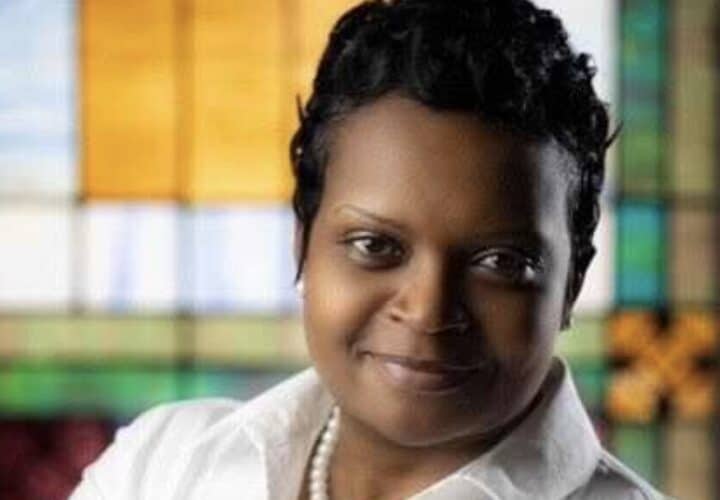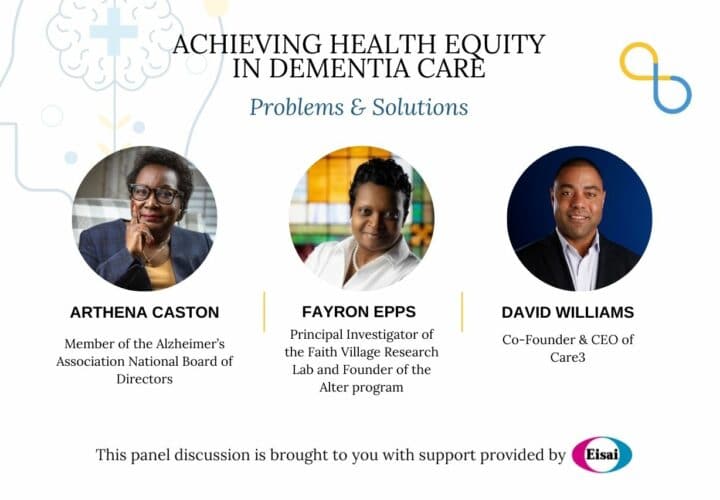Ty Lewis, professional educator, certified dementia consultant, wife, mother, and care partner to her own mother, explains how normalizing dementia has the potential to create better outcomes for the Black community.
This article is part of the series Diversity & Dementia, produced by Being Patient with support provided by Eisai.
Like most dementia caregivers, Ty Lewis is resourceful.
When her mother, Gertrude Jordan, was diagnosed with dementia in 2014 at the age of 70, Lewis, an educator, wife and mother of two daughters, started learning as much as she could about the disease and how to advocate for someone with it.
For the first six years following her diagnosis, Jordan was left under the care of her husband until his death in February 2020. For Lewis, there was no question what would happen after that. “We went all in” as a family to care for her mother in their home, she said.
Since then, Lewis has grown her social media reach to more than 30,000 Instagram followers under the profile “I Am Gertrude Jordan,” which reveals the day-to-day experience of caring for a loved one with dementia.
Her mother’s disease also ushered in a new professional track for Lewis, a longtime special education professional. She’s now a certified Alzheimer’s and dementia care trainer and National Council of Certified Dementia Practitioners certified dementia practitioner.
As CEO and owner of In Case I Forget, LLC, Lewis uses her education background to provide dementia training and coaching consultancy that empowers family caregivers and eldercare professionals with research-based strategies for improving outcomes.
Sometimes, life calls you to a different path, she told Being Patient. “For me, it was teaching parents in special education, and so I just transitioned to helping people with dementia based on the strategies I’ve learned in education,” Lewis said.
She’s also amplifying the voice of African American caregivers, a space that has no shortage of racial disparity and stigma. As a Black caregiver and a public figure in the dementia education and advocacy space, “I always have to have my ducks in a row,” she said.
Lewis believes this kind of pressure can sometimes deter other Black caregivers and advocates from speaking out or seeking resources for themselves or their loved ones.
“When it comes to black caregivers
getting the help they need, and they
continue to see a white space, they’ll never
get the help. … If they don’t see
faces like me, they’ll never buy in.”
“In this space, most caregivers don’t look like me,” Lewis said. “When it comes to Black caregivers getting the help they need, and they continue to see a white space, they’ll never get the help. … If they don’t see faces like me, they’ll never buy in.”
Lewis can recall many conferences, Zoom calls, and consultations where her expertise has been passed over in favor of the insights or support from her white colleagues.
“I was sitting at a table with a lady from England who needed help with her daughter who had dyslexia,” she recalled. “So I was like, ‘Hey, you know, I’m a special education teacher, special education advocate, you need to do ABCD.’ One of my white counterparts sitting next to me was also an educator but did not have the special expertise I did. And so after I told the parent what to do, the woman turned to my white counterpart and asked, ‘Will you sit in on this meeting with me?’ My mouth dropped to the floor.”
A big part of why Lewis chose to be so open about her experience caring for her mother on social media comes back to the idea of visibility.
“That’s why I created the platform
for individuals — white, Black, Asian,
everybody—to have a safe space.”
“Other Black caregivers aren’t going to advocate for their loved ones because they don’t see someone that looks like them, and they’re less likely to get the help that they need,” she said. “And so that’s why I created the platform for individuals — white, Black, Asian, everybody—to have a safe space.”
Lewis collaborates often with other Black caregivers, such as like Jacqueline Revere of @momofmymom and Jessica Guthrie of @careercaregivingcollide on Instagram, where they collectively reach hundreds of thousands of followers with the message that while caregiving is a common phenomenon, it’s also an incredibly individual journey that takes love and compassion.
“I tell people all the time that this is not just about caregiving. This is about a lifestyle. You have to have a passion for all humans,” Lewis said.
Lewis plans to continue growing her platform so that people of color will begin to feel more comfortable as both caregivers and advocates.
“I think if we change the face of what consulting and educators and experts in this space look like, we will not have as many stigmas and disparities in different communities,” she said. “Once we begin to lead with love and have that acceptance and peace, [we can continue to] have these conversations.”
Despite how race plays into the overall conversation, leading with love is how Lewis intends to move forward in her business, as her mother’s primary caregiver, as a wife to her husband, and as a mother to two teen girls breaking into the L.A. acting scene, among myriad other activities.
“When we start normalizing dementia, I believe
that’s when change will come.”
On social media, she said, “I’m showing the good and the bad. I’m showing that Mommy is crying at dinner and pulling her wig off at the table, but we’re still having a good time. That’s not going to stop me. When we normalize dementia, we will begin to see a change. When we stop acting like it’s some terrible disease and stop keeping our loved ones trapped, and start normalizing it and start taking them out, and stop apologizing for their disease … I believe that’s when change will come.”
Deeply rooted in Christian values, Lewis hopes leading with love becomes a universal way to create change where it’s needed most.
“You can feed the poor. You can speak in tongues. You can preach. You can do all these things,” she said. “But if you don’t have love, you have nothing. Love changes the hearts of others. Love allows you to see the differences of people and still serve them. And so when you lead with love, you’ll be able to do anything.”





I am a black woman who is now taking care of my husband with Alzheimer. You guys are offering so much information for me to learn about this horrific disease. I am extremely stressed, but I thank God I found you and I am truly feeling hopeful.
Thank you
W.J.